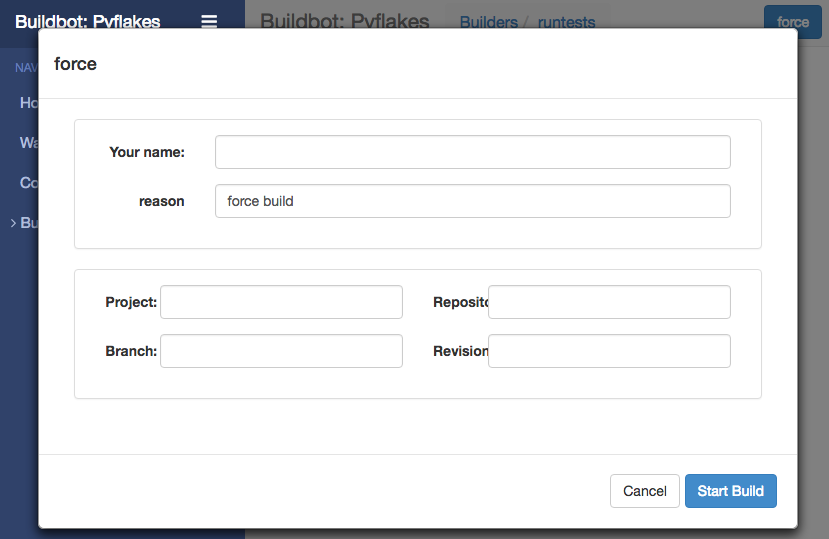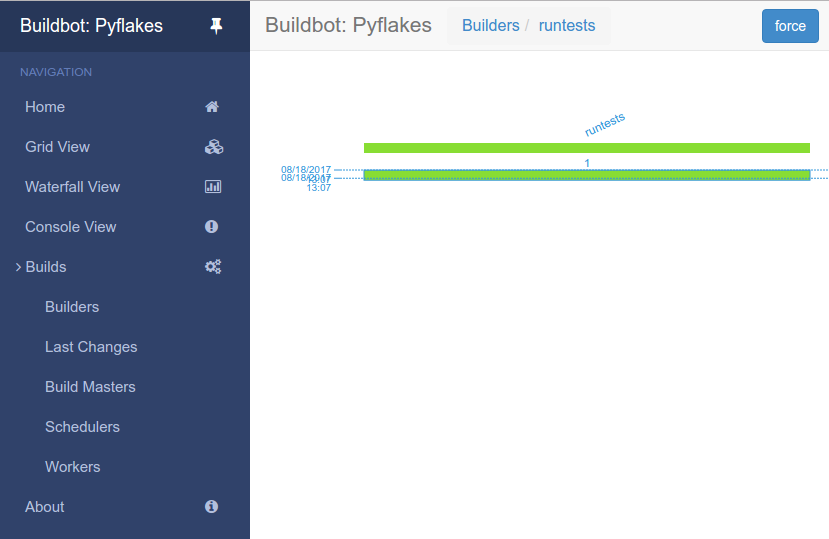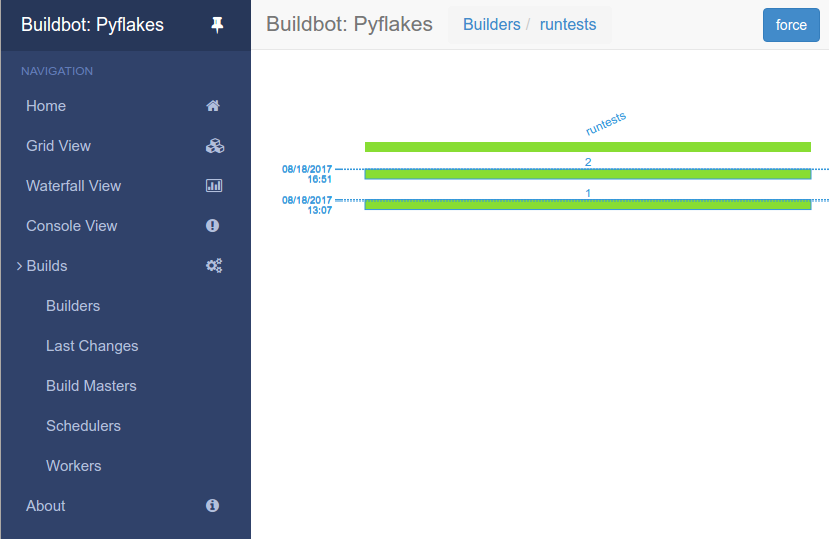Caution
This page documents the latest, unreleased version of Buildbot. For documentation for released versions, see https://docs.buildbot.net/current/.
1.2. A Quick Tour
1.2.1. Goal
This tutorial will expand on the First Run tutorial by taking a quick tour around some of the features of buildbot that are hinted at in the comments in the sample configuration. We will simply change parts of the default configuration and explain the activated features.
As a part of this tutorial, we will make buildbot do a few actual builds.
This section will teach you how to:
make simple configuration changes and activate them
deal with configuration errors
force builds
enable and control the IRC bot
add a ‘try’ scheduler
1.2.2. The First Build
On the Builders page, click on the runtests link. You’ll see a builder page, and a blue “force” button that will bring up the following dialog box:

Click Start Build - there’s no need to fill in any of the fields in this case. Next, click on view in waterfall.
You will now see that a successful test run has happened:

This simple process is essentially the whole purpose of the Buildbot project.
The information about what actions are executed for a certain build are defined in things called builders.
The information about when a certain builder should launch a build are defined in things called schedulers. In fact, the blue “force” button that was pushed in this example activated a scheduler too.
1.2.3. Setting Project Name and URL
Let’s start simple by looking at where you would customize the buildbot’s project name and URL.
We continue where we left off in the First Run tutorial.
Open a new terminal, go to the directory you created master in, activate the same virtualenv
instance you created before, and open the master configuration file with an editor (here
$EDITOR is your editor of choice like vim, gedit, or emacs):
cd ~/buildbot-test/master
source sandbox/bin/activate
$EDITOR master/master.cfg
Now, look for the section marked PROJECT IDENTITY which reads:
####### PROJECT IDENTITY
# the 'title' string will appear at the top of this buildbot installation's
# home pages (linked to the 'titleURL').
c['title'] = "Hello World CI"
c['titleURL'] = "https://buildbot.github.io/hello-world/"
If you want, you can change either of these links to anything you want so that you can see what happens when you change them.
After making a change, go to the terminal and type:
buildbot reconfig master
You will see a handful of lines of output from the master log, much like this:
2011-12-04 10:11:09-0600 [-] loading configuration from /path/to/buildbot/master.cfg
2011-12-04 10:11:09-0600 [-] configuration update started
2011-12-04 10:11:09-0600 [-] builder runtests is unchanged
2011-12-04 10:11:09-0600 [-] removing IStatusReceiver <...>
2011-12-04 10:11:09-0600 [-] (TCP Port 8010 Closed)
2011-12-04 10:11:09-0600 [-] Stopping factory <...>
2011-12-04 10:11:09-0600 [-] adding IStatusReceiver <...>
2011-12-04 10:11:09-0600 [-] RotateLogSite starting on 8010
2011-12-04 10:11:09-0600 [-] Starting factory <...>
2011-12-04 10:11:09-0600 [-] Setting up http.log rotating 10 files of 10000000 bytes each
2011-12-04 10:11:09-0600 [-] WebStatus using (/path/to/buildbot/public_html)
2011-12-04 10:11:09-0600 [-] removing 0 old schedulers, updating 0, and adding 0
2011-12-04 10:11:09-0600 [-] adding 1 new changesources, removing 1
2011-12-04 10:11:09-0600 [-] gitpoller: using workdir '/path/to/buildbot/gitpoller-workdir'
2011-12-04 10:11:09-0600 [-] GitPoller repository already exists
2011-12-04 10:11:09-0600 [-] configuration update complete
Reconfiguration appears to have completed successfully.
The important lines are the ones telling you that the new configuration is being loaded (at the top) and that the update is complete (at the bottom).
Now, if you go back to the waterfall page, you will see that the project’s name is whatever you may have changed it to, and when you click on the URL of the project name at the bottom of the page, it should take you to the link you put in the configuration.
1.2.4. Configuration Errors
It is very common to make a mistake when configuring buildbot, so you might as well see now what happens in that case and what you can do to fix the error.
Open up the config again and introduce a syntax error by removing the first single quote in the two lines you changed before, so they read:
c[title'] = "Hello World CI"
c[titleURL'] = "https://buildbot.github.io/hello-world/"
This creates a Python SyntaxError.
Now go ahead and reconfig the master:
buildbot reconfig master
This time, the output looks like:
2015-08-14 18:40:46+0000 [-] beginning configuration update
2015-08-14 18:40:46+0000 [-] Loading configuration from '/data/buildbot/master/master.cfg'
2015-08-14 18:40:46+0000 [-] error while parsing config file:
Traceback (most recent call last):
File "/usr/local/lib/python2.7/dist-packages/buildbot/master.py", line 265, in reconfig
d = self.doReconfig()
File "/usr/local/lib/python2.7/dist-packages/twisted/internet/defer.py", line 1274, in unwindGenerator
return _inlineCallbacks(None, gen, Deferred())
File "/usr/local/lib/python2.7/dist-packages/twisted/internet/defer.py", line 1128, in _inlineCallbacks
result = g.send(result)
File "/usr/local/lib/python2.7/dist-packages/buildbot/master.py", line 289, in doReconfig
self.configFileName)
--- <exception caught here> ---
File "/usr/local/lib/python2.7/dist-packages/buildbot/config.py", line 156, in loadConfig
exec f in localDict
exceptions.SyntaxError: EOL while scanning string literal (master.cfg, line 103)
2015-08-14 18:40:46+0000 [-] error while parsing config file: EOL while scanning string literal (master.cfg, line 103) (traceback in logfile)
2015-08-14 18:40:46+0000 [-] reconfig aborted without making any changes
Reconfiguration failed. Please inspect the master.cfg file for errors,
correct them, then try 'buildbot reconfig' again.
This time, it’s clear that there was a mistake in the configuration. Luckily, the Buildbot master will ignore the wrong configuration and keep running with the previous configuration.
The message is clear enough, so open the configuration again, fix the error, and reconfig the master.
1.2.5. Enabling the IRC Bot
Buildbot includes an IRC bot that you can tell to join a channel to control and report on the status of buildbot.
Note
Security Note
Please note that any user having access to your IRC channel, or can send a private message to the bot, will be able to create or stop builds bug #3377.
First, start an IRC client of your choice, connect to irc.freenode.net and join an empty channel.
In this example we will use #buildbot-test, so go join that channel.
(Note: please do not join the main buildbot channel!)
Edit master.cfg and look for the BUILDBOT SERVICES section.
At the end of that section add the lines:
c['services'].append(reporters.IRC(host="irc.freenode.net", nick="bbtest",
channels=["#buildbot-test"]))
The reconfigure the master and type:
grep -i irc master/twistd.log
The log output should contain a line like this:
2016-11-13 15:53:06+0100 [-] Starting factory <...>
2016-11-13 15:53:19+0100 [IrcStatusBot,client] <...>: I have joined #buildbot-test
You should see the bot now joining in your IRC client. In your IRC channel, type:
bbtest: commands
to get a list of the commands the bot supports.
Let’s tell the bot to notify on certain events. To learn on which EVENTS we can notify, type:
bbtest: help notify
Now, let’s set some event notifications:
<@lsblakk> bbtest: notify on started finished failure
< bbtest> The following events are being notified: ['started', 'failure', 'finished']
Now, go back to the web interface and force another build. Alternatively, ask the bot to force a build:
<@lsblakk> bbtest: force build --codebase= runtests
< bbtest> build #1 of runtests started
< bbtest> Hey! build runtests #1 is complete: Success [finished]
You can also see the new builds in the web interface.

The full documentation is available at IRC.
1.2.7. Adding a ‘try’ scheduler
Buildbot includes a way for developers to submit patches for testing without committing them to the source code control system. (This is really handy for projects that support several operating systems or architectures.)
To set this up, add the following lines to master.cfg:
from buildbot.scheduler import Try_Userpass
c['schedulers'] = []
c['schedulers'].append(Try_Userpass(
name='try',
builderNames=['runtests'],
port=5555,
userpass=[('sampleuser','samplepass')]))
Then you can submit changes using the try command.
Let’s try this out by making a one-line change to hello-world, say, to make it trace the tree by default:
git clone https://github.com/buildbot/hello-world.git hello-world-git
cd hello-world-git/hello
$EDITOR __init__.py
# change 'return "hello " + who' on line 6 to 'return "greets " + who'
Then run buildbot’s try command as follows:
cd ~/buildbot-test/master
source sandbox/bin/activate
buildbot try --connect=pb --master=127.0.0.1:5555 \
--username=sampleuser --passwd=samplepass --vc=git
This will do git diff for you and send the resulting patch to the server for build and test
against the latest sources from Git.
Now go back to the waterfall page, click on the runtests link, and scroll down. You should see that another build has been started with your change (and stdout for the tests should be chock-full of parse trees as a result). The “Reason” for the job will be listed as “‘try’ job”, and the blamelist will be empty.
To make yourself show up as the author of the change, use the --who=emailaddr option on
buildbot try to pass your email address.
To make a description of the change show up, use the --properties=comment="this is a comment"
option on buildbot try.
To use ssh instead of a private username/password database, see Try_Jobdir.